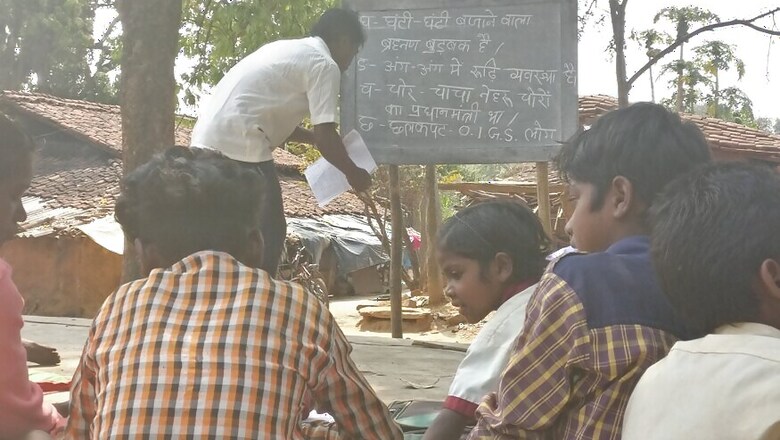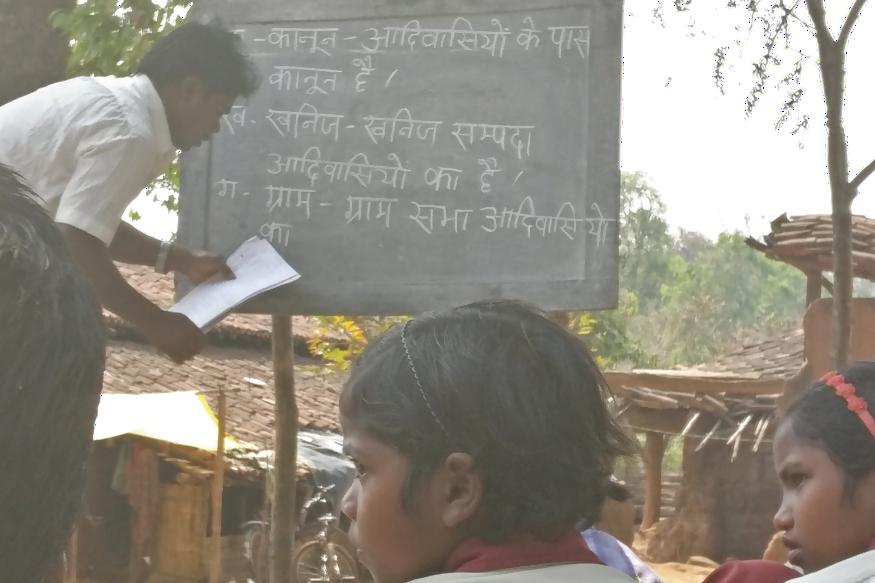
views
News18 brings to you a special series on the movement led by adivasis, which has spread across hundreds of villages in several states. We will publish a detailed immersive with videos, photographs, illustrations and ground reports from Jharkhand, MP and Odisha, on March 26.
Sukharam Mundu starts the day’s class with Hindi. He begins with the letters, from ‘Ka’ to ‘Cha’, exemplifying their usage with sample sentences.
“Ka se Kanoon. Adivasiyon ke pass kanoon hai.”
“Kha se Khanij. Khanij sampada adivasiyon ki hai.”
“Ga se Gram Sabha. Gram sabha adivasiyon ki rudi pratha hai.”
“Gha se Ghanti. Ghanti bajane waala brahman budbak hai.”
“Cha se chor. Chacha Nehru choron ka pradhanmantri tha.”

One by one, all 15 students in his class, come up to the blackboard, and with some prodding from the teacher, read this out.
The teacher goes on teach "Ja se Jameen. Sampoorn desh ki jameen adivasiyon ki hai...Ba se Buddhimaan. Adivasi buddhimaan hote hain...Ma se Maalik. Adivasi log Bharat desh ke maalik hain...La se Lootera. Loktantra looteron ka tantra hai...Va se Vote. Vote vyavastha Hinduon ki hai."
The students, from as young as 5 to as old as 12, who till last month used to study in various grades in local government schools, are now beginning their education all over again.
This is the first standard of the newly devised adivasi school syllabus prescribed by tribal leaders in Khunti, who have declared autonomy from India.
The exercise of seeking autonomy from India started around a year ago in this district in Jharkhand through a ceremony called Patthargarhi. Sixty villages in this district alone have done Patthargarhi, which means they don’t recognise the government of India anymore, including its institutions like Parliament, legislative assemblies, identification cards and its education system.
In other states like Odisha and Madhya Pradesh where Patthargarhi has just started, the tribal leaders are taking inspiration from Khunti and are busy compiling their own syllabi.
Both students and teachers are being forced to take these classes.
The students have been warned against attending government schools. Those who defy these orders are forced to pay Rs 500 per month as punishment, and those attending the quack schools are asked to pay Rs 50 per month as fees, both of which are huge amounts considering half of Khunti’s population is below poverty line.
Mundu says he was ordered to leave his job as a teaching assistant with an NGO running free classes for underprivileged children. At the end of February he was handed a few pages, since the syllabus being composed by the autonomous leadership is still not ready, a blackboard and some chalk, and ordered to start teaching in village Udburu from March.
“How much did you earn as a learning assistance?”
“Rs 5,000”
“And how much have you been promised here?”
“Actually, they haven’t told me anything about salary yet.”
Mundu may be too scared to come out and say how much his fixed Rs 5,000 salary meant to him and what a disaster he’s just been pushed to, not to talk about how his culpability in ruining the future of all these children who are devotedly memorising the nonsense he’s writing on the blackboard. But he just smiles and looks around and gets back to the blackboard.
“Now let’s start the English class,” he tells the students.
The notebooks his students are skimming through while their teacher writes a fresh set of alphabets and sentences on board, contain the remains of an education they till recently used to receive. Teachers’ red ink circling incorrect arithmetic and failed general knowledge quizzes.
“A se Adivasi.”
“B se Bidesi.”
“C se Chotanagpur kastkaari adhiniyam.”
“D se Dharti.”
“E se Emigran.”
“F se Pita.”
And so on, which includes "M se Maalik...V se Queen Victoria...X se Xenophobia".
Mathematics and science are not taught at these schools since the tribal leadership is still deliberating on their syllabi. While students come one by one reading aloud what’s written on the blackboard, Mundu admits that keeping students from standard 5 and standard 1 in the same class is unfair to the seniors but he can’t move them around till further orders from the education committee.
Three such schools, in Udburu, Jikilata and Uldi, are running in Khunti right now. These schools now have students from over a dozen villages. The government schools and the teachers teaching there have been left with barely any students.
In Bhandra, for instance, a teacher deputed to the local government school says that the number of students in her class has dropped from 52 to 8 now.
“How will we have students when families who have barely enough to eat are fined Rs 500 for sending their children to our schools? There are six schools here in Bhandra and all of them have more teachers than students,” says the teacher who did not want to be identified.
One of the students in the government school said that he and his brother come to this school secretly. “We come only after 10 when most of the villagers are out.”
Joseph Purti, a tribal leader, who has been organising the exclusionary Patthargarhi movement in Jharkhand and in other states says that the reason they’re not discouraging children from studying in government-run schools is because they teach nothing about adivasi history and their culture.
“Why should we send our children to government schools? The books they have there don’t even mention us. They don’t teach our culture, our language. What good is this education to our children if they forget their own roots? Our very existence has been obliterated from the annals of NCERT and CBSE syllabi,” Purti says.
Tribal leaders in Sundargarh, in Odisha, and Dindori, in Madhya Pradesh agree with Purti.
“While we aren’t withdrawing our children from government schools yet, but the government needs to include our history and language in their syllabi. Otherwise we will take over their schools and run them the way we want to,” says Baldev Singh Dhurbe, gram pradhan of Devri Kalan village, 90 kms from the nearest city —Jabalpur. Patthargarhi happened here five months ago.




















Comments
0 comment